GSK Scandal in China: A Case Study in Business Ethics
VerifiedAdded on 2020/05/04
|12
|2729
|159
Report
AI Summary
This report delves into the GSK scandal in China, a significant case of ethical misconduct within the pharmaceutical industry. It examines GSK's role in the corrupted environment, including bribery allegations involving hospitals and doctors. The report analyzes the discrimination faced by foreign companies in China and GSK's responses to the accusations. It explores GSK's current operations and future outlook, including efforts to rebuild its reputation and adapt to the Chinese market. The study also discusses China's hospitability for multinational corporations, highlighting challenges such as red tape, communication barriers, and cultural differences. Recommendations are provided for multinational organizations planning to expand into the Chinese market, emphasizing the importance of ethical practices and understanding local regulations. Furthermore, the report considers the legal frameworks relevant to multinational companies operating internationally, including political, legal, and tax implications. The conclusion emphasizes the importance of ethical conduct and corporate governance for multinational companies in the global market. The report is contributed by a student to be published on the website Desklib.
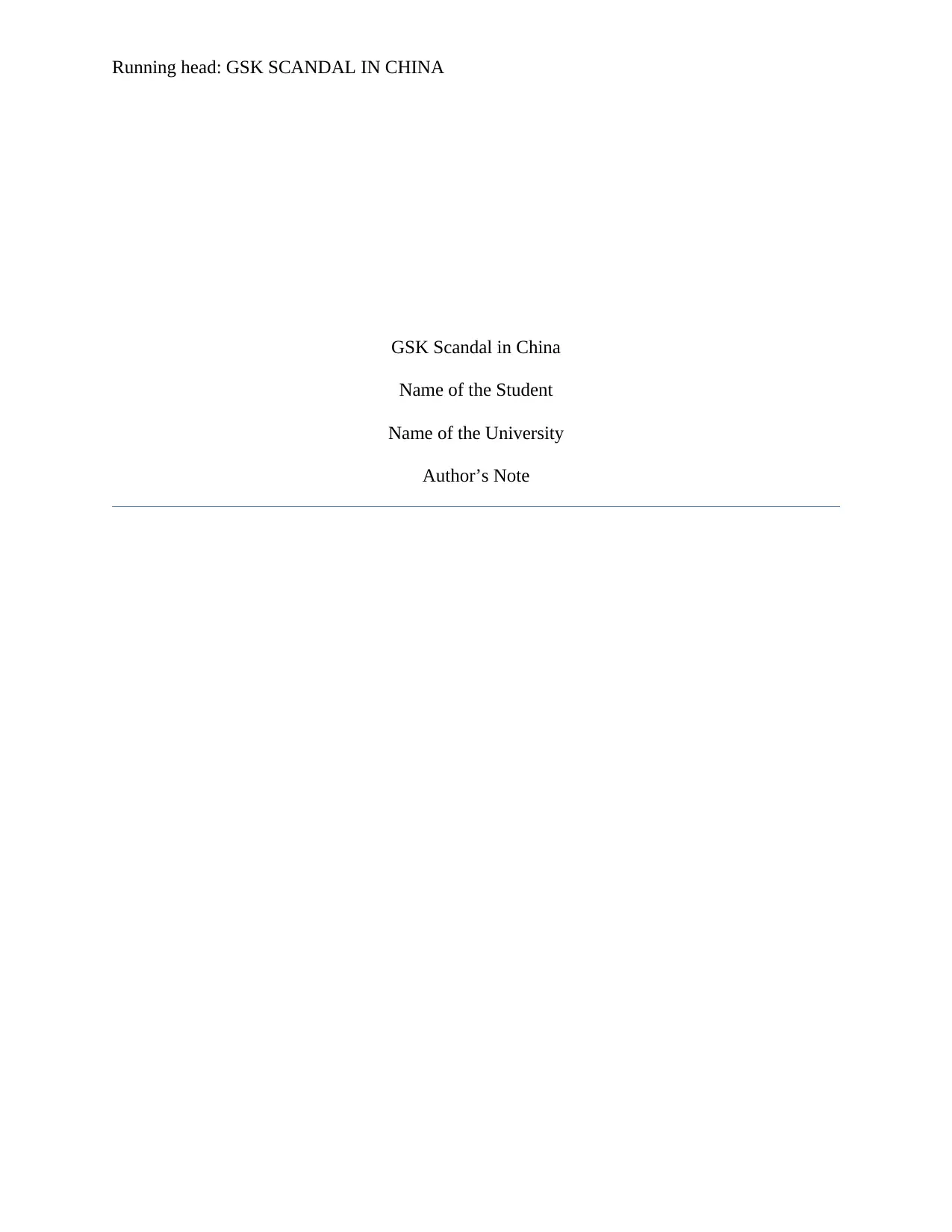
Running head: GSK SCANDAL IN CHINA
GSK Scandal in China
Name of the Student
Name of the University
Author’s Note
GSK Scandal in China
Name of the Student
Name of the University
Author’s Note
Paraphrase This Document
Need a fresh take? Get an instant paraphrase of this document with our AI Paraphraser
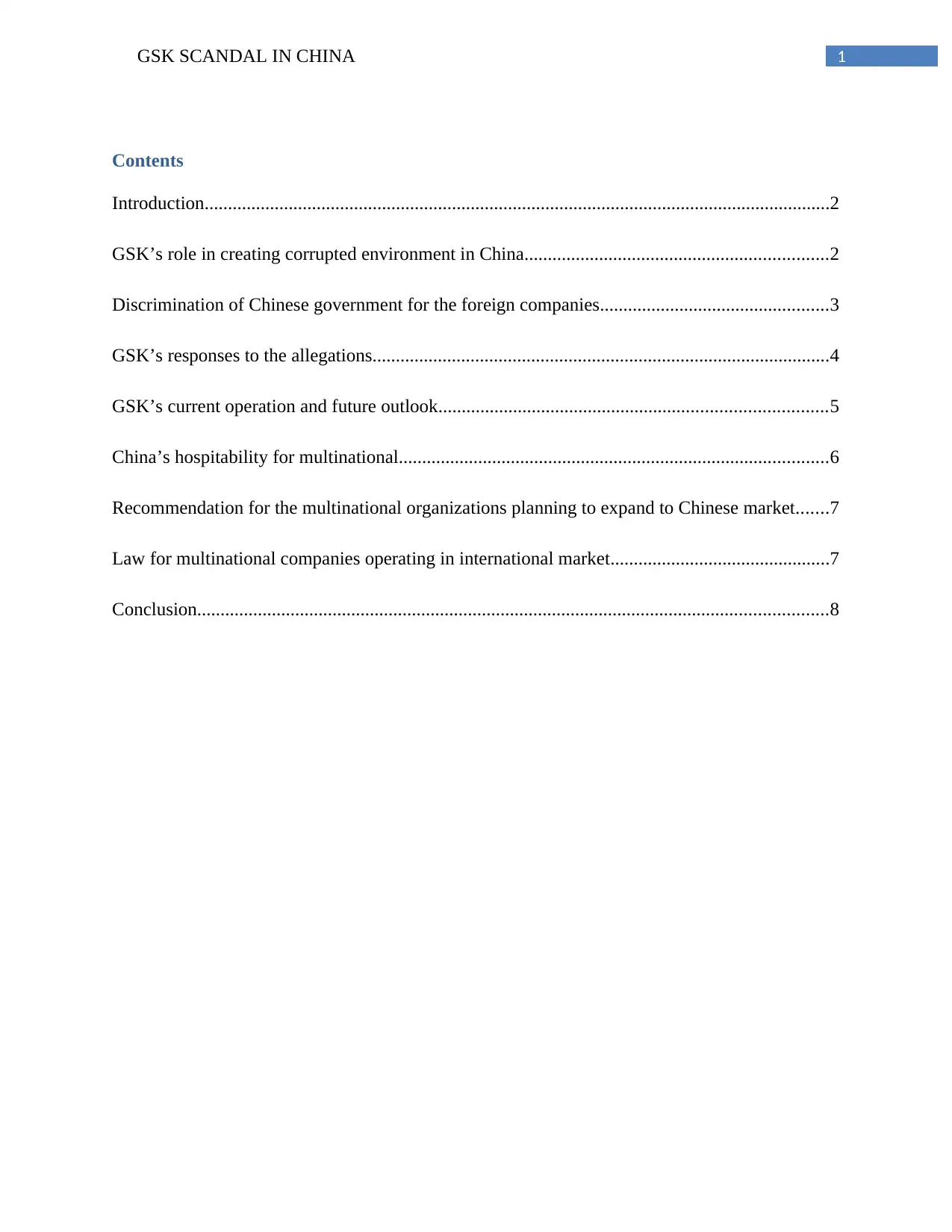
1GSK SCANDAL IN CHINA
Contents
Introduction......................................................................................................................................2
GSK’s role in creating corrupted environment in China.................................................................2
Discrimination of Chinese government for the foreign companies.................................................3
GSK’s responses to the allegations..................................................................................................4
GSK’s current operation and future outlook...................................................................................5
China’s hospitability for multinational............................................................................................6
Recommendation for the multinational organizations planning to expand to Chinese market.......7
Law for multinational companies operating in international market...............................................7
Conclusion.......................................................................................................................................8
Contents
Introduction......................................................................................................................................2
GSK’s role in creating corrupted environment in China.................................................................2
Discrimination of Chinese government for the foreign companies.................................................3
GSK’s responses to the allegations..................................................................................................4
GSK’s current operation and future outlook...................................................................................5
China’s hospitability for multinational............................................................................................6
Recommendation for the multinational organizations planning to expand to Chinese market.......7
Law for multinational companies operating in international market...............................................7
Conclusion.......................................................................................................................................8
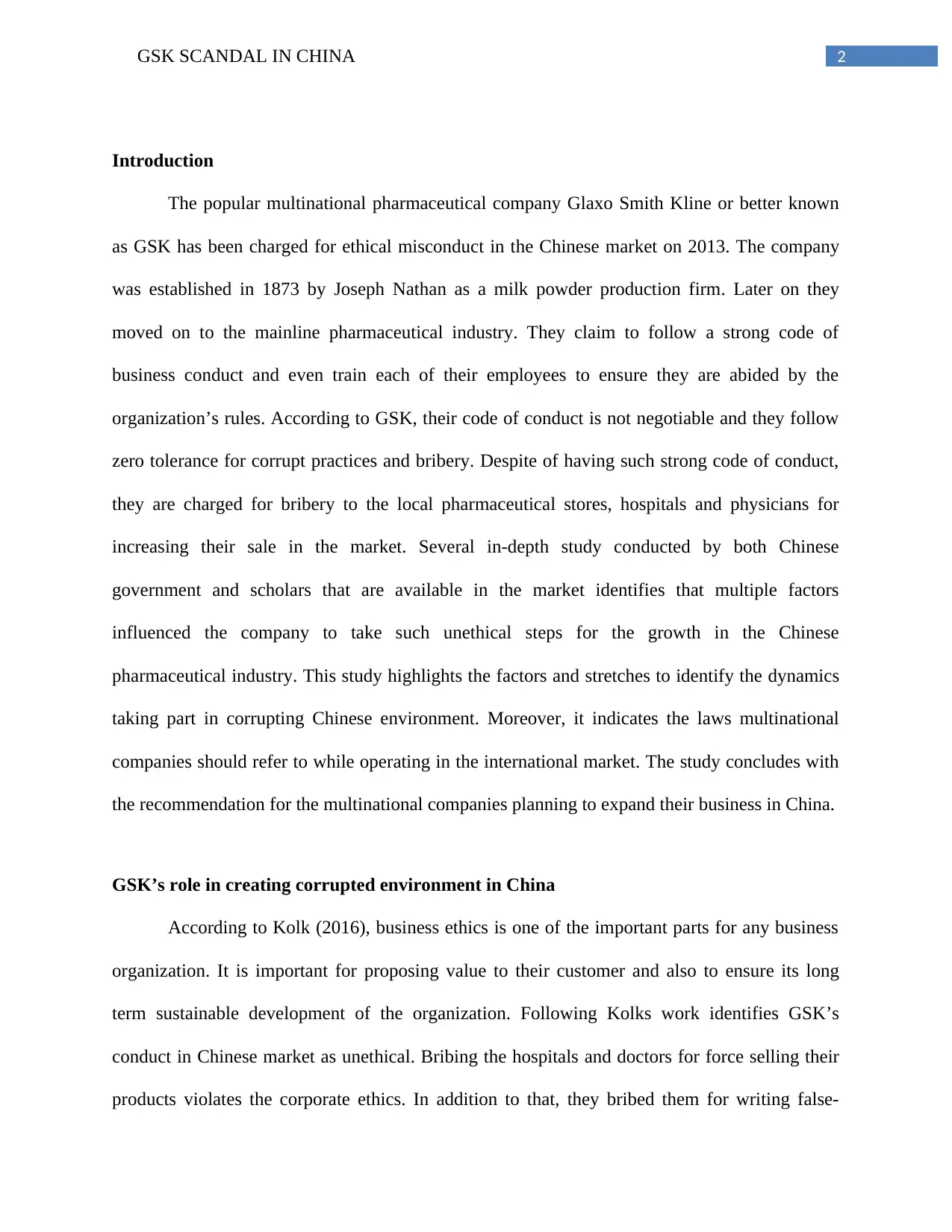
2GSK SCANDAL IN CHINA
Introduction
The popular multinational pharmaceutical company Glaxo Smith Kline or better known
as GSK has been charged for ethical misconduct in the Chinese market on 2013. The company
was established in 1873 by Joseph Nathan as a milk powder production firm. Later on they
moved on to the mainline pharmaceutical industry. They claim to follow a strong code of
business conduct and even train each of their employees to ensure they are abided by the
organization’s rules. According to GSK, their code of conduct is not negotiable and they follow
zero tolerance for corrupt practices and bribery. Despite of having such strong code of conduct,
they are charged for bribery to the local pharmaceutical stores, hospitals and physicians for
increasing their sale in the market. Several in-depth study conducted by both Chinese
government and scholars that are available in the market identifies that multiple factors
influenced the company to take such unethical steps for the growth in the Chinese
pharmaceutical industry. This study highlights the factors and stretches to identify the dynamics
taking part in corrupting Chinese environment. Moreover, it indicates the laws multinational
companies should refer to while operating in the international market. The study concludes with
the recommendation for the multinational companies planning to expand their business in China.
GSK’s role in creating corrupted environment in China
According to Kolk (2016), business ethics is one of the important parts for any business
organization. It is important for proposing value to their customer and also to ensure its long
term sustainable development of the organization. Following Kolks work identifies GSK’s
conduct in Chinese market as unethical. Bribing the hospitals and doctors for force selling their
products violates the corporate ethics. In addition to that, they bribed them for writing false-
Introduction
The popular multinational pharmaceutical company Glaxo Smith Kline or better known
as GSK has been charged for ethical misconduct in the Chinese market on 2013. The company
was established in 1873 by Joseph Nathan as a milk powder production firm. Later on they
moved on to the mainline pharmaceutical industry. They claim to follow a strong code of
business conduct and even train each of their employees to ensure they are abided by the
organization’s rules. According to GSK, their code of conduct is not negotiable and they follow
zero tolerance for corrupt practices and bribery. Despite of having such strong code of conduct,
they are charged for bribery to the local pharmaceutical stores, hospitals and physicians for
increasing their sale in the market. Several in-depth study conducted by both Chinese
government and scholars that are available in the market identifies that multiple factors
influenced the company to take such unethical steps for the growth in the Chinese
pharmaceutical industry. This study highlights the factors and stretches to identify the dynamics
taking part in corrupting Chinese environment. Moreover, it indicates the laws multinational
companies should refer to while operating in the international market. The study concludes with
the recommendation for the multinational companies planning to expand their business in China.
GSK’s role in creating corrupted environment in China
According to Kolk (2016), business ethics is one of the important parts for any business
organization. It is important for proposing value to their customer and also to ensure its long
term sustainable development of the organization. Following Kolks work identifies GSK’s
conduct in Chinese market as unethical. Bribing the hospitals and doctors for force selling their
products violates the corporate ethics. In addition to that, they bribed them for writing false-
⊘ This is a preview!⊘
Do you want full access?
Subscribe today to unlock all pages.

Trusted by 1+ million students worldwide
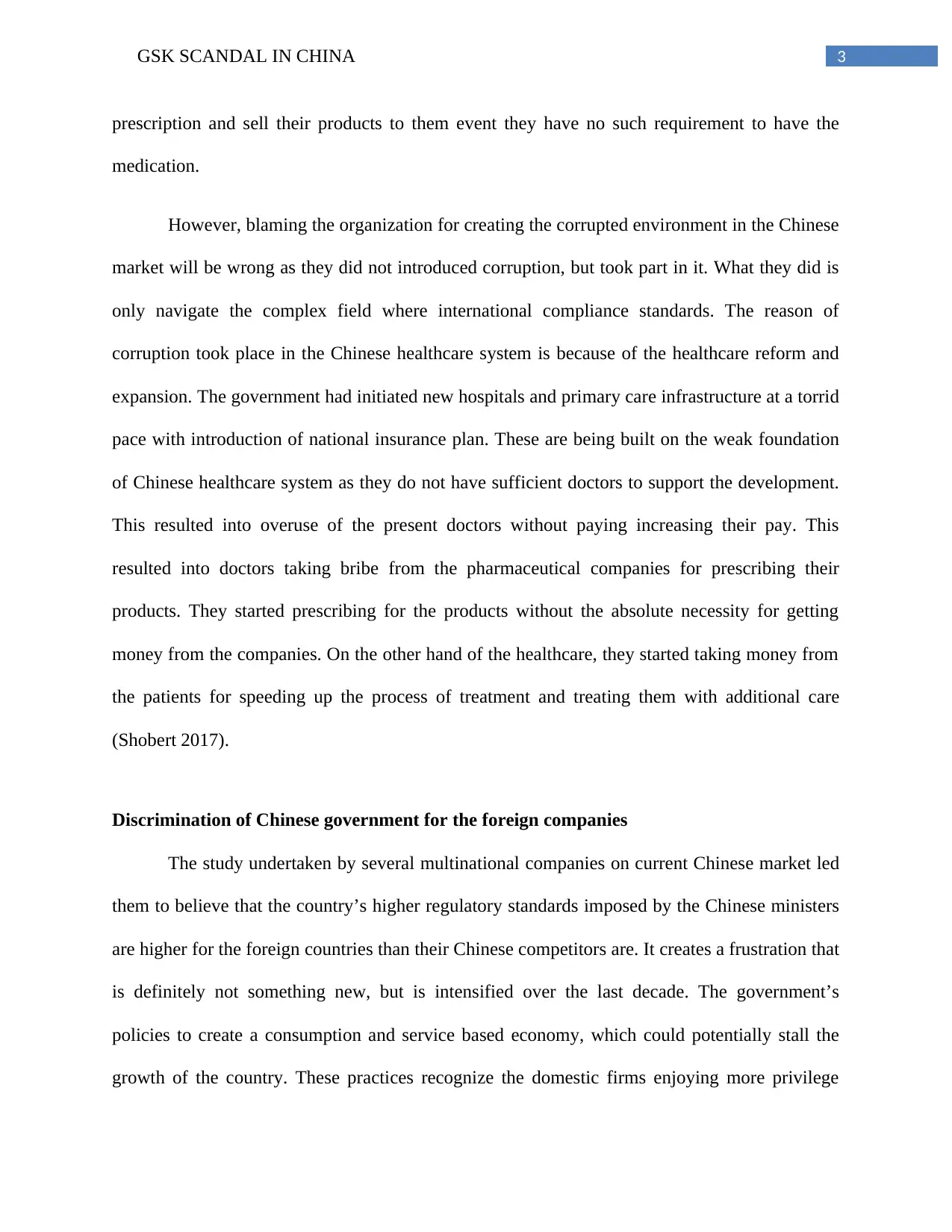
3GSK SCANDAL IN CHINA
prescription and sell their products to them event they have no such requirement to have the
medication.
However, blaming the organization for creating the corrupted environment in the Chinese
market will be wrong as they did not introduced corruption, but took part in it. What they did is
only navigate the complex field where international compliance standards. The reason of
corruption took place in the Chinese healthcare system is because of the healthcare reform and
expansion. The government had initiated new hospitals and primary care infrastructure at a torrid
pace with introduction of national insurance plan. These are being built on the weak foundation
of Chinese healthcare system as they do not have sufficient doctors to support the development.
This resulted into overuse of the present doctors without paying increasing their pay. This
resulted into doctors taking bribe from the pharmaceutical companies for prescribing their
products. They started prescribing for the products without the absolute necessity for getting
money from the companies. On the other hand of the healthcare, they started taking money from
the patients for speeding up the process of treatment and treating them with additional care
(Shobert 2017).
Discrimination of Chinese government for the foreign companies
The study undertaken by several multinational companies on current Chinese market led
them to believe that the country’s higher regulatory standards imposed by the Chinese ministers
are higher for the foreign countries than their Chinese competitors are. It creates a frustration that
is definitely not something new, but is intensified over the last decade. The government’s
policies to create a consumption and service based economy, which could potentially stall the
growth of the country. These practices recognize the domestic firms enjoying more privilege
prescription and sell their products to them event they have no such requirement to have the
medication.
However, blaming the organization for creating the corrupted environment in the Chinese
market will be wrong as they did not introduced corruption, but took part in it. What they did is
only navigate the complex field where international compliance standards. The reason of
corruption took place in the Chinese healthcare system is because of the healthcare reform and
expansion. The government had initiated new hospitals and primary care infrastructure at a torrid
pace with introduction of national insurance plan. These are being built on the weak foundation
of Chinese healthcare system as they do not have sufficient doctors to support the development.
This resulted into overuse of the present doctors without paying increasing their pay. This
resulted into doctors taking bribe from the pharmaceutical companies for prescribing their
products. They started prescribing for the products without the absolute necessity for getting
money from the companies. On the other hand of the healthcare, they started taking money from
the patients for speeding up the process of treatment and treating them with additional care
(Shobert 2017).
Discrimination of Chinese government for the foreign companies
The study undertaken by several multinational companies on current Chinese market led
them to believe that the country’s higher regulatory standards imposed by the Chinese ministers
are higher for the foreign countries than their Chinese competitors are. It creates a frustration that
is definitely not something new, but is intensified over the last decade. The government’s
policies to create a consumption and service based economy, which could potentially stall the
growth of the country. These practices recognize the domestic firms enjoying more privilege
Paraphrase This Document
Need a fresh take? Get an instant paraphrase of this document with our AI Paraphraser
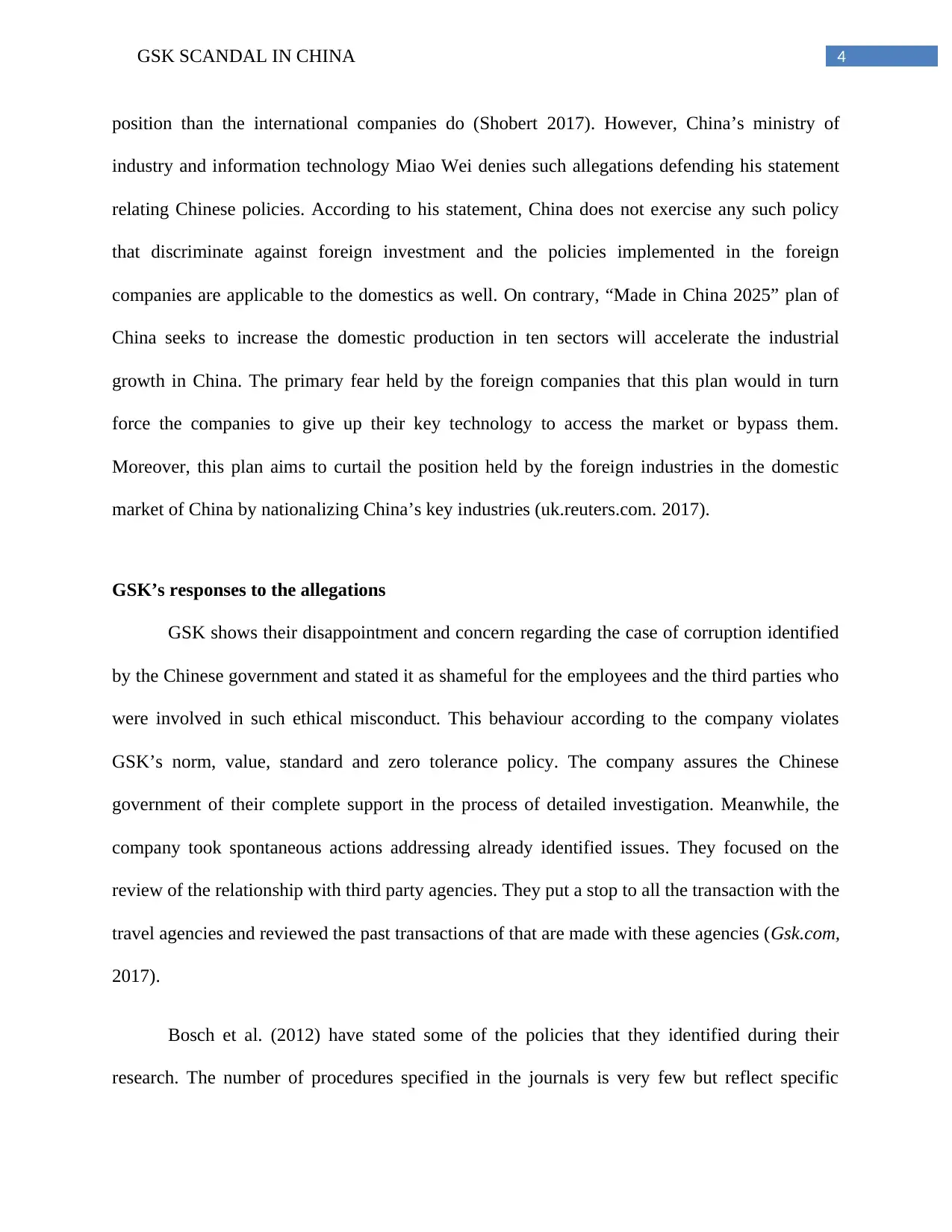
4GSK SCANDAL IN CHINA
position than the international companies do (Shobert 2017). However, China’s ministry of
industry and information technology Miao Wei denies such allegations defending his statement
relating Chinese policies. According to his statement, China does not exercise any such policy
that discriminate against foreign investment and the policies implemented in the foreign
companies are applicable to the domestics as well. On contrary, “Made in China 2025” plan of
China seeks to increase the domestic production in ten sectors will accelerate the industrial
growth in China. The primary fear held by the foreign companies that this plan would in turn
force the companies to give up their key technology to access the market or bypass them.
Moreover, this plan aims to curtail the position held by the foreign industries in the domestic
market of China by nationalizing China’s key industries (uk.reuters.com. 2017).
GSK’s responses to the allegations
GSK shows their disappointment and concern regarding the case of corruption identified
by the Chinese government and stated it as shameful for the employees and the third parties who
were involved in such ethical misconduct. This behaviour according to the company violates
GSK’s norm, value, standard and zero tolerance policy. The company assures the Chinese
government of their complete support in the process of detailed investigation. Meanwhile, the
company took spontaneous actions addressing already identified issues. They focused on the
review of the relationship with third party agencies. They put a stop to all the transaction with the
travel agencies and reviewed the past transactions of that are made with these agencies (Gsk.com,
2017).
Bosch et al. (2012) have stated some of the policies that they identified during their
research. The number of procedures specified in the journals is very few but reflect specific
position than the international companies do (Shobert 2017). However, China’s ministry of
industry and information technology Miao Wei denies such allegations defending his statement
relating Chinese policies. According to his statement, China does not exercise any such policy
that discriminate against foreign investment and the policies implemented in the foreign
companies are applicable to the domestics as well. On contrary, “Made in China 2025” plan of
China seeks to increase the domestic production in ten sectors will accelerate the industrial
growth in China. The primary fear held by the foreign companies that this plan would in turn
force the companies to give up their key technology to access the market or bypass them.
Moreover, this plan aims to curtail the position held by the foreign industries in the domestic
market of China by nationalizing China’s key industries (uk.reuters.com. 2017).
GSK’s responses to the allegations
GSK shows their disappointment and concern regarding the case of corruption identified
by the Chinese government and stated it as shameful for the employees and the third parties who
were involved in such ethical misconduct. This behaviour according to the company violates
GSK’s norm, value, standard and zero tolerance policy. The company assures the Chinese
government of their complete support in the process of detailed investigation. Meanwhile, the
company took spontaneous actions addressing already identified issues. They focused on the
review of the relationship with third party agencies. They put a stop to all the transaction with the
travel agencies and reviewed the past transactions of that are made with these agencies (Gsk.com,
2017).
Bosch et al. (2012) have stated some of the policies that they identified during their
research. The number of procedures specified in the journals is very few but reflect specific
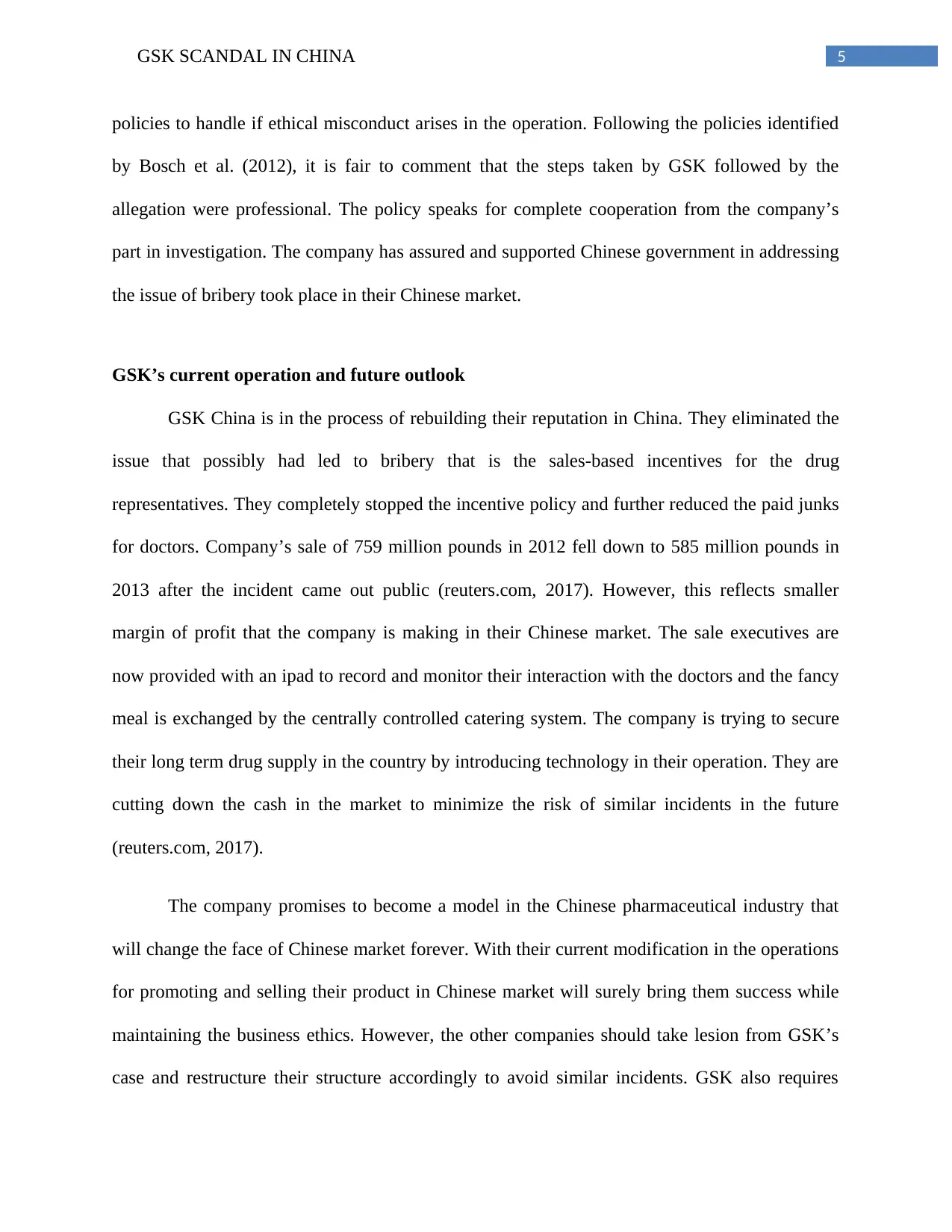
5GSK SCANDAL IN CHINA
policies to handle if ethical misconduct arises in the operation. Following the policies identified
by Bosch et al. (2012), it is fair to comment that the steps taken by GSK followed by the
allegation were professional. The policy speaks for complete cooperation from the company’s
part in investigation. The company has assured and supported Chinese government in addressing
the issue of bribery took place in their Chinese market.
GSK’s current operation and future outlook
GSK China is in the process of rebuilding their reputation in China. They eliminated the
issue that possibly had led to bribery that is the sales-based incentives for the drug
representatives. They completely stopped the incentive policy and further reduced the paid junks
for doctors. Company’s sale of 759 million pounds in 2012 fell down to 585 million pounds in
2013 after the incident came out public (reuters.com, 2017). However, this reflects smaller
margin of profit that the company is making in their Chinese market. The sale executives are
now provided with an ipad to record and monitor their interaction with the doctors and the fancy
meal is exchanged by the centrally controlled catering system. The company is trying to secure
their long term drug supply in the country by introducing technology in their operation. They are
cutting down the cash in the market to minimize the risk of similar incidents in the future
(reuters.com, 2017).
The company promises to become a model in the Chinese pharmaceutical industry that
will change the face of Chinese market forever. With their current modification in the operations
for promoting and selling their product in Chinese market will surely bring them success while
maintaining the business ethics. However, the other companies should take lesion from GSK’s
case and restructure their structure accordingly to avoid similar incidents. GSK also requires
policies to handle if ethical misconduct arises in the operation. Following the policies identified
by Bosch et al. (2012), it is fair to comment that the steps taken by GSK followed by the
allegation were professional. The policy speaks for complete cooperation from the company’s
part in investigation. The company has assured and supported Chinese government in addressing
the issue of bribery took place in their Chinese market.
GSK’s current operation and future outlook
GSK China is in the process of rebuilding their reputation in China. They eliminated the
issue that possibly had led to bribery that is the sales-based incentives for the drug
representatives. They completely stopped the incentive policy and further reduced the paid junks
for doctors. Company’s sale of 759 million pounds in 2012 fell down to 585 million pounds in
2013 after the incident came out public (reuters.com, 2017). However, this reflects smaller
margin of profit that the company is making in their Chinese market. The sale executives are
now provided with an ipad to record and monitor their interaction with the doctors and the fancy
meal is exchanged by the centrally controlled catering system. The company is trying to secure
their long term drug supply in the country by introducing technology in their operation. They are
cutting down the cash in the market to minimize the risk of similar incidents in the future
(reuters.com, 2017).
The company promises to become a model in the Chinese pharmaceutical industry that
will change the face of Chinese market forever. With their current modification in the operations
for promoting and selling their product in Chinese market will surely bring them success while
maintaining the business ethics. However, the other companies should take lesion from GSK’s
case and restructure their structure accordingly to avoid similar incidents. GSK also requires
⊘ This is a preview!⊘
Do you want full access?
Subscribe today to unlock all pages.

Trusted by 1+ million students worldwide
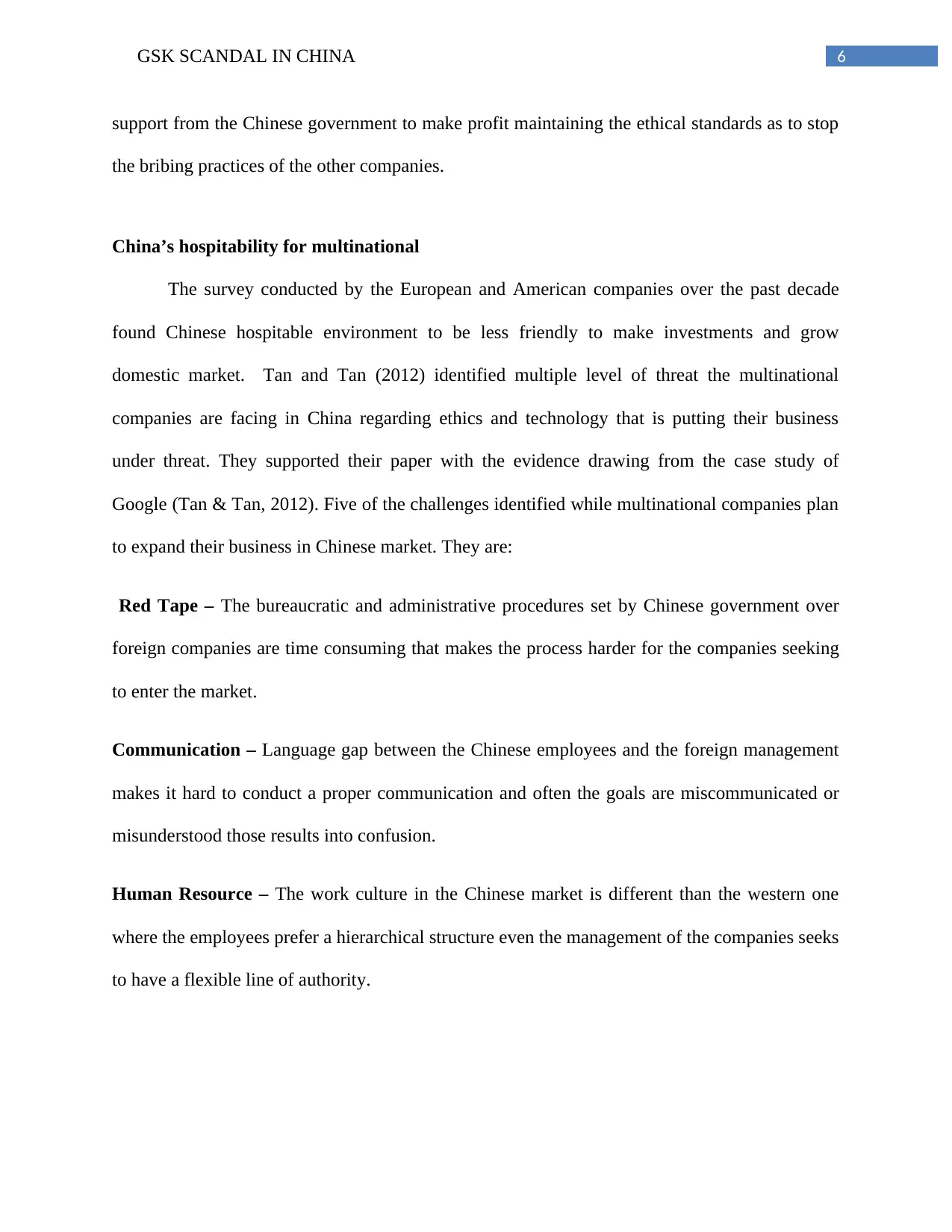
6GSK SCANDAL IN CHINA
support from the Chinese government to make profit maintaining the ethical standards as to stop
the bribing practices of the other companies.
China’s hospitability for multinational
The survey conducted by the European and American companies over the past decade
found Chinese hospitable environment to be less friendly to make investments and grow
domestic market. Tan and Tan (2012) identified multiple level of threat the multinational
companies are facing in China regarding ethics and technology that is putting their business
under threat. They supported their paper with the evidence drawing from the case study of
Google (Tan & Tan, 2012). Five of the challenges identified while multinational companies plan
to expand their business in Chinese market. They are:
Red Tape – The bureaucratic and administrative procedures set by Chinese government over
foreign companies are time consuming that makes the process harder for the companies seeking
to enter the market.
Communication – Language gap between the Chinese employees and the foreign management
makes it hard to conduct a proper communication and often the goals are miscommunicated or
misunderstood those results into confusion.
Human Resource – The work culture in the Chinese market is different than the western one
where the employees prefer a hierarchical structure even the management of the companies seeks
to have a flexible line of authority.
support from the Chinese government to make profit maintaining the ethical standards as to stop
the bribing practices of the other companies.
China’s hospitability for multinational
The survey conducted by the European and American companies over the past decade
found Chinese hospitable environment to be less friendly to make investments and grow
domestic market. Tan and Tan (2012) identified multiple level of threat the multinational
companies are facing in China regarding ethics and technology that is putting their business
under threat. They supported their paper with the evidence drawing from the case study of
Google (Tan & Tan, 2012). Five of the challenges identified while multinational companies plan
to expand their business in Chinese market. They are:
Red Tape – The bureaucratic and administrative procedures set by Chinese government over
foreign companies are time consuming that makes the process harder for the companies seeking
to enter the market.
Communication – Language gap between the Chinese employees and the foreign management
makes it hard to conduct a proper communication and often the goals are miscommunicated or
misunderstood those results into confusion.
Human Resource – The work culture in the Chinese market is different than the western one
where the employees prefer a hierarchical structure even the management of the companies seeks
to have a flexible line of authority.
Paraphrase This Document
Need a fresh take? Get an instant paraphrase of this document with our AI Paraphraser
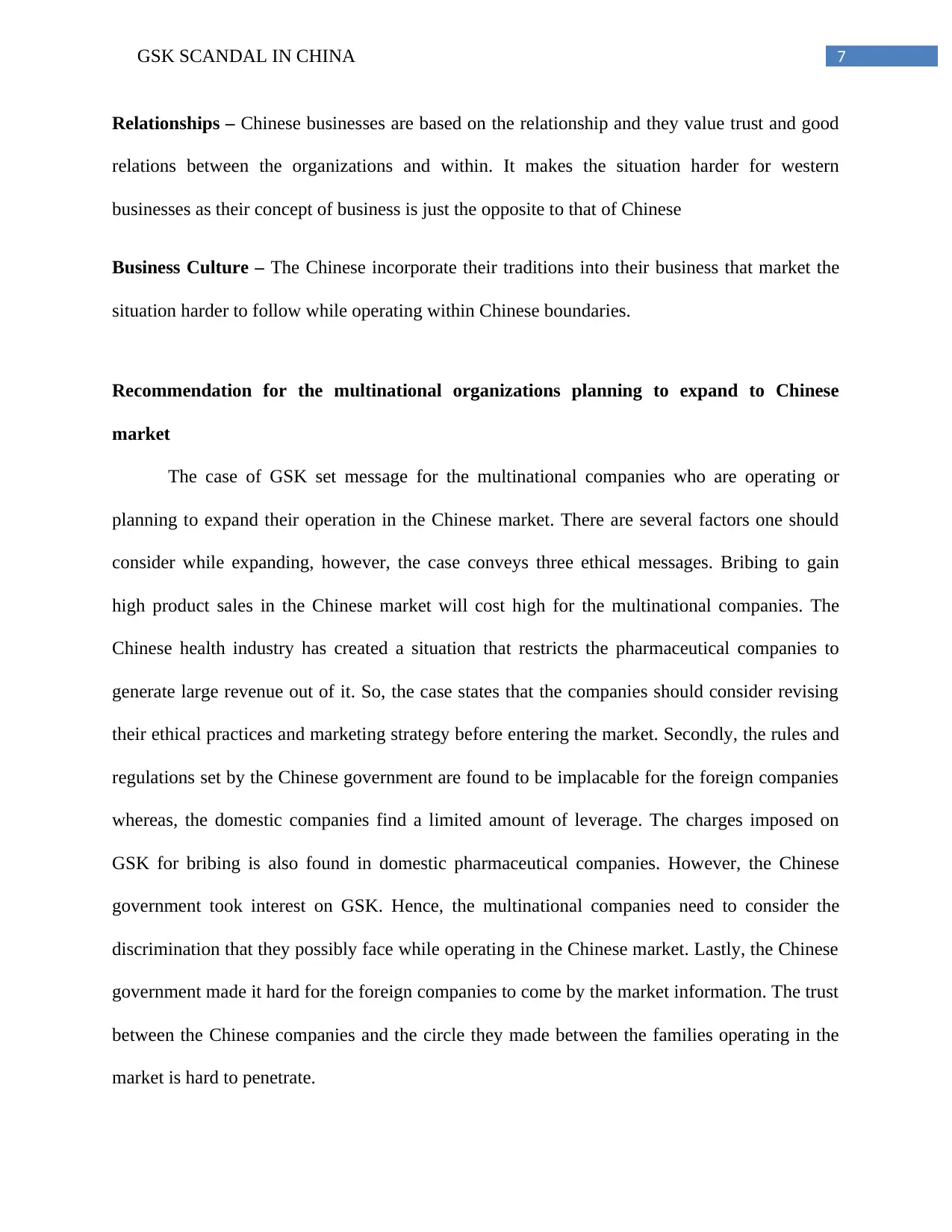
7GSK SCANDAL IN CHINA
Relationships – Chinese businesses are based on the relationship and they value trust and good
relations between the organizations and within. It makes the situation harder for western
businesses as their concept of business is just the opposite to that of Chinese
Business Culture – The Chinese incorporate their traditions into their business that market the
situation harder to follow while operating within Chinese boundaries.
Recommendation for the multinational organizations planning to expand to Chinese
market
The case of GSK set message for the multinational companies who are operating or
planning to expand their operation in the Chinese market. There are several factors one should
consider while expanding, however, the case conveys three ethical messages. Bribing to gain
high product sales in the Chinese market will cost high for the multinational companies. The
Chinese health industry has created a situation that restricts the pharmaceutical companies to
generate large revenue out of it. So, the case states that the companies should consider revising
their ethical practices and marketing strategy before entering the market. Secondly, the rules and
regulations set by the Chinese government are found to be implacable for the foreign companies
whereas, the domestic companies find a limited amount of leverage. The charges imposed on
GSK for bribing is also found in domestic pharmaceutical companies. However, the Chinese
government took interest on GSK. Hence, the multinational companies need to consider the
discrimination that they possibly face while operating in the Chinese market. Lastly, the Chinese
government made it hard for the foreign companies to come by the market information. The trust
between the Chinese companies and the circle they made between the families operating in the
market is hard to penetrate.
Relationships – Chinese businesses are based on the relationship and they value trust and good
relations between the organizations and within. It makes the situation harder for western
businesses as their concept of business is just the opposite to that of Chinese
Business Culture – The Chinese incorporate their traditions into their business that market the
situation harder to follow while operating within Chinese boundaries.
Recommendation for the multinational organizations planning to expand to Chinese
market
The case of GSK set message for the multinational companies who are operating or
planning to expand their operation in the Chinese market. There are several factors one should
consider while expanding, however, the case conveys three ethical messages. Bribing to gain
high product sales in the Chinese market will cost high for the multinational companies. The
Chinese health industry has created a situation that restricts the pharmaceutical companies to
generate large revenue out of it. So, the case states that the companies should consider revising
their ethical practices and marketing strategy before entering the market. Secondly, the rules and
regulations set by the Chinese government are found to be implacable for the foreign companies
whereas, the domestic companies find a limited amount of leverage. The charges imposed on
GSK for bribing is also found in domestic pharmaceutical companies. However, the Chinese
government took interest on GSK. Hence, the multinational companies need to consider the
discrimination that they possibly face while operating in the Chinese market. Lastly, the Chinese
government made it hard for the foreign companies to come by the market information. The trust
between the Chinese companies and the circle they made between the families operating in the
market is hard to penetrate.
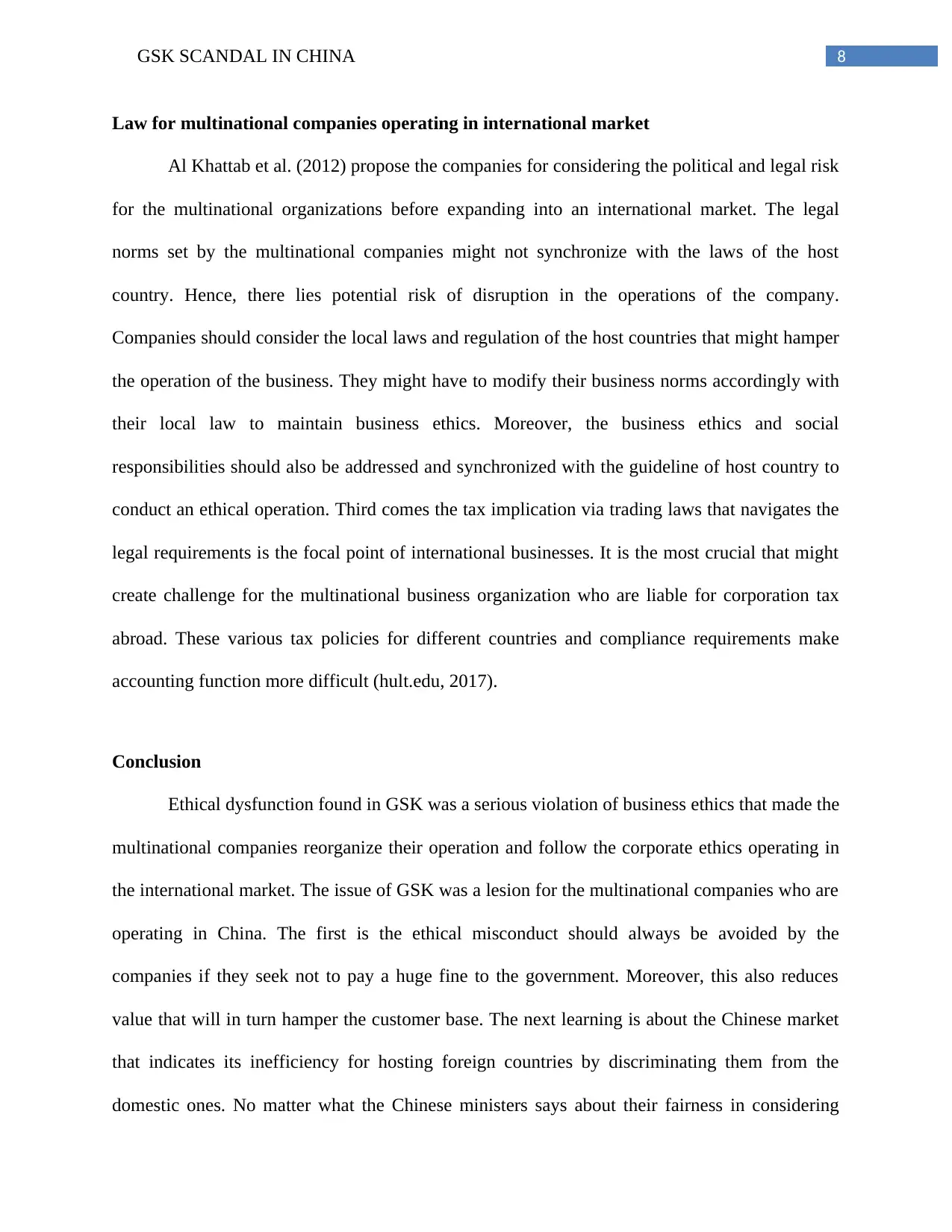
8GSK SCANDAL IN CHINA
Law for multinational companies operating in international market
Al Khattab et al. (2012) propose the companies for considering the political and legal risk
for the multinational organizations before expanding into an international market. The legal
norms set by the multinational companies might not synchronize with the laws of the host
country. Hence, there lies potential risk of disruption in the operations of the company.
Companies should consider the local laws and regulation of the host countries that might hamper
the operation of the business. They might have to modify their business norms accordingly with
their local law to maintain business ethics. Moreover, the business ethics and social
responsibilities should also be addressed and synchronized with the guideline of host country to
conduct an ethical operation. Third comes the tax implication via trading laws that navigates the
legal requirements is the focal point of international businesses. It is the most crucial that might
create challenge for the multinational business organization who are liable for corporation tax
abroad. These various tax policies for different countries and compliance requirements make
accounting function more difficult (hult.edu, 2017).
Conclusion
Ethical dysfunction found in GSK was a serious violation of business ethics that made the
multinational companies reorganize their operation and follow the corporate ethics operating in
the international market. The issue of GSK was a lesion for the multinational companies who are
operating in China. The first is the ethical misconduct should always be avoided by the
companies if they seek not to pay a huge fine to the government. Moreover, this also reduces
value that will in turn hamper the customer base. The next learning is about the Chinese market
that indicates its inefficiency for hosting foreign countries by discriminating them from the
domestic ones. No matter what the Chinese ministers says about their fairness in considering
Law for multinational companies operating in international market
Al Khattab et al. (2012) propose the companies for considering the political and legal risk
for the multinational organizations before expanding into an international market. The legal
norms set by the multinational companies might not synchronize with the laws of the host
country. Hence, there lies potential risk of disruption in the operations of the company.
Companies should consider the local laws and regulation of the host countries that might hamper
the operation of the business. They might have to modify their business norms accordingly with
their local law to maintain business ethics. Moreover, the business ethics and social
responsibilities should also be addressed and synchronized with the guideline of host country to
conduct an ethical operation. Third comes the tax implication via trading laws that navigates the
legal requirements is the focal point of international businesses. It is the most crucial that might
create challenge for the multinational business organization who are liable for corporation tax
abroad. These various tax policies for different countries and compliance requirements make
accounting function more difficult (hult.edu, 2017).
Conclusion
Ethical dysfunction found in GSK was a serious violation of business ethics that made the
multinational companies reorganize their operation and follow the corporate ethics operating in
the international market. The issue of GSK was a lesion for the multinational companies who are
operating in China. The first is the ethical misconduct should always be avoided by the
companies if they seek not to pay a huge fine to the government. Moreover, this also reduces
value that will in turn hamper the customer base. The next learning is about the Chinese market
that indicates its inefficiency for hosting foreign countries by discriminating them from the
domestic ones. No matter what the Chinese ministers says about their fairness in considering
⊘ This is a preview!⊘
Do you want full access?
Subscribe today to unlock all pages.

Trusted by 1+ million students worldwide
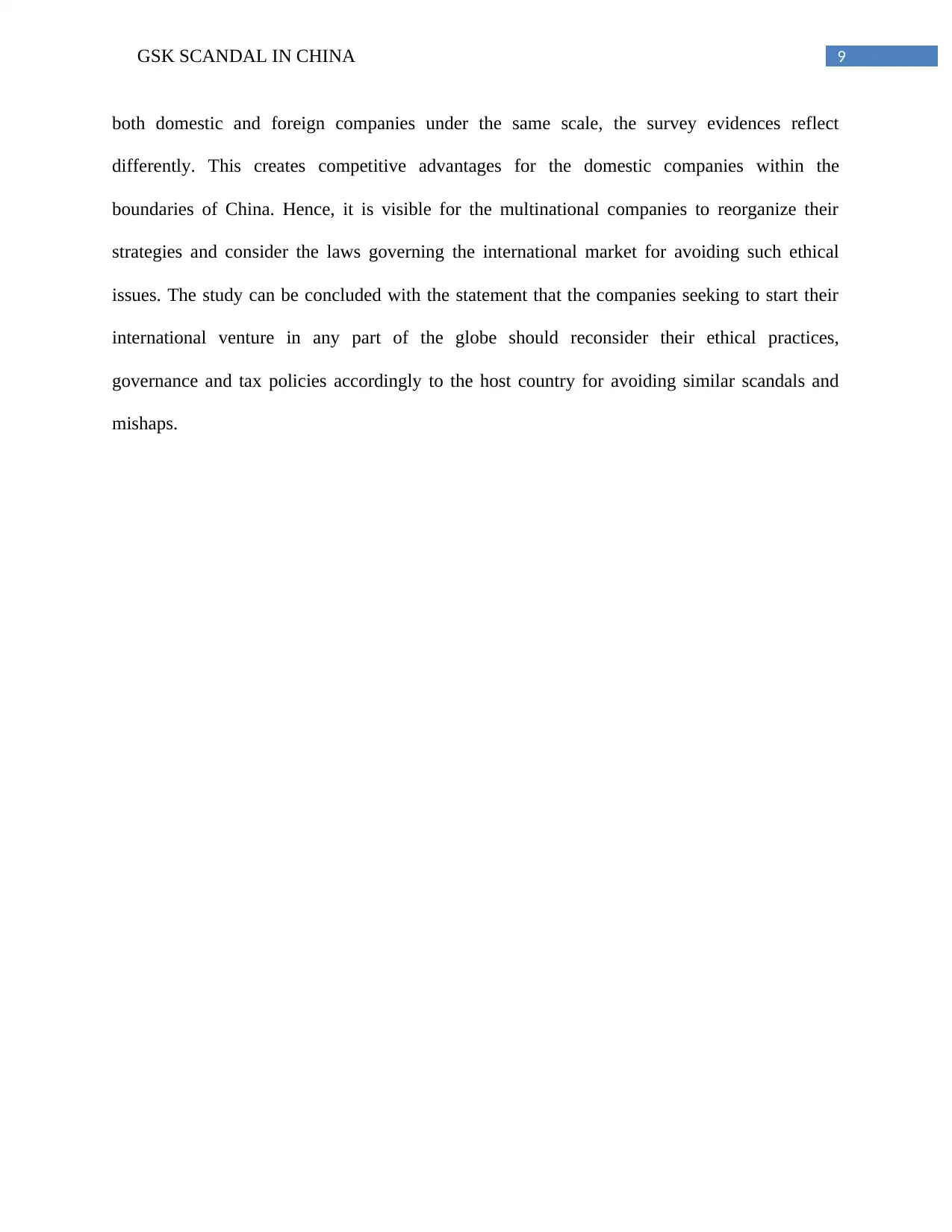
9GSK SCANDAL IN CHINA
both domestic and foreign companies under the same scale, the survey evidences reflect
differently. This creates competitive advantages for the domestic companies within the
boundaries of China. Hence, it is visible for the multinational companies to reorganize their
strategies and consider the laws governing the international market for avoiding such ethical
issues. The study can be concluded with the statement that the companies seeking to start their
international venture in any part of the globe should reconsider their ethical practices,
governance and tax policies accordingly to the host country for avoiding similar scandals and
mishaps.
both domestic and foreign companies under the same scale, the survey evidences reflect
differently. This creates competitive advantages for the domestic companies within the
boundaries of China. Hence, it is visible for the multinational companies to reorganize their
strategies and consider the laws governing the international market for avoiding such ethical
issues. The study can be concluded with the statement that the companies seeking to start their
international venture in any part of the globe should reconsider their ethical practices,
governance and tax policies accordingly to the host country for avoiding similar scandals and
mishaps.
Paraphrase This Document
Need a fresh take? Get an instant paraphrase of this document with our AI Paraphraser
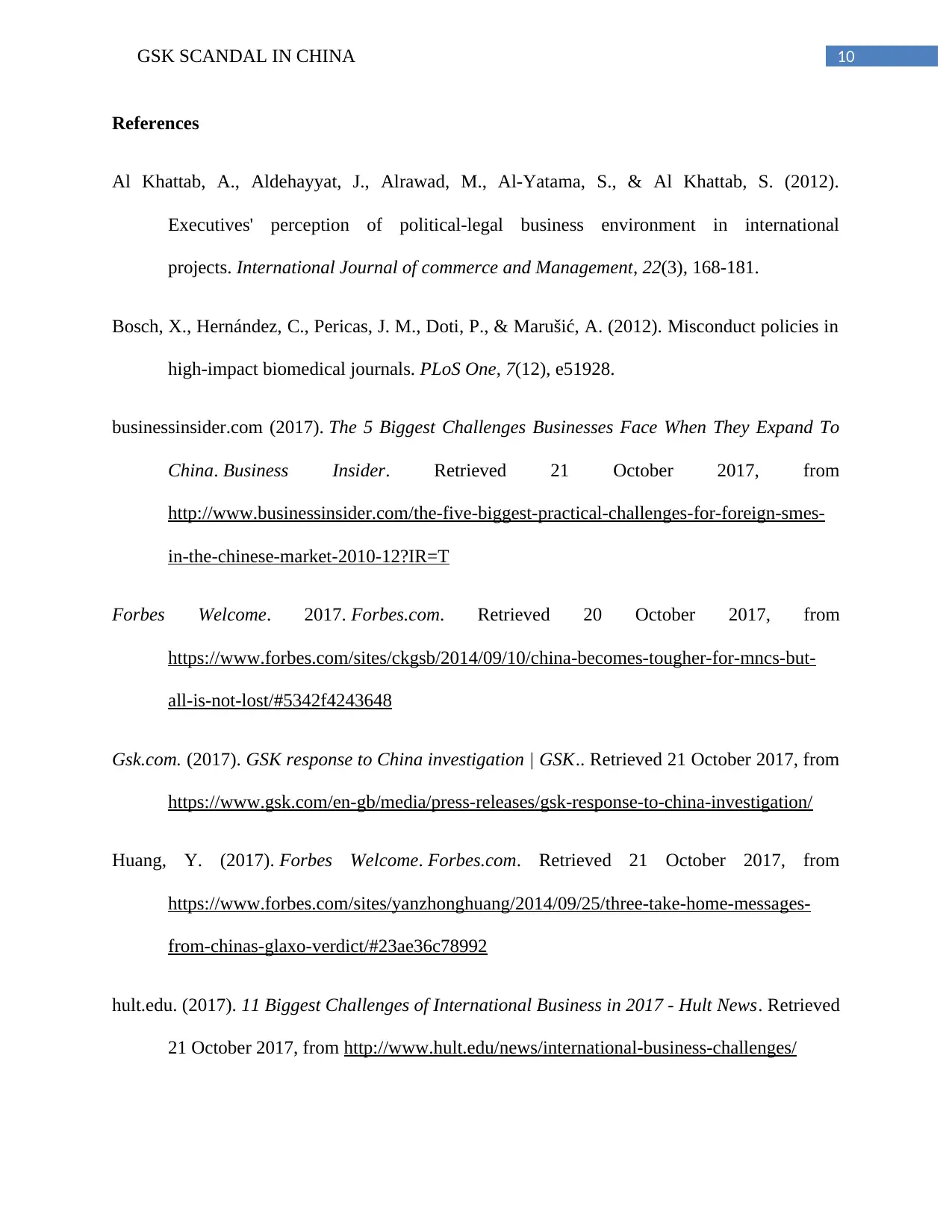
10GSK SCANDAL IN CHINA
References
Al Khattab, A., Aldehayyat, J., Alrawad, M., Al-Yatama, S., & Al Khattab, S. (2012).
Executives' perception of political-legal business environment in international
projects. International Journal of commerce and Management, 22(3), 168-181.
Bosch, X., Hernández, C., Pericas, J. M., Doti, P., & Marušić, A. (2012). Misconduct policies in
high-impact biomedical journals. PLoS One, 7(12), e51928.
businessinsider.com (2017). The 5 Biggest Challenges Businesses Face When They Expand To
China. Business Insider. Retrieved 21 October 2017, from
http://www.businessinsider.com/the-five-biggest-practical-challenges-for-foreign-smes-
in-the-chinese-market-2010-12?IR=T
Forbes Welcome. 2017. Forbes.com. Retrieved 20 October 2017, from
https://www.forbes.com/sites/ckgsb/2014/09/10/china-becomes-tougher-for-mncs-but-
all-is-not-lost/#5342f4243648
Gsk.com. (2017). GSK response to China investigation | GSK.. Retrieved 21 October 2017, from
https://www.gsk.com/en-gb/media/press-releases/gsk-response-to-china-investigation/
Huang, Y. (2017). Forbes Welcome. Forbes.com. Retrieved 21 October 2017, from
https://www.forbes.com/sites/yanzhonghuang/2014/09/25/three-take-home-messages-
from-chinas-glaxo-verdict/#23ae36c78992
hult.edu. (2017). 11 Biggest Challenges of International Business in 2017 - Hult News. Retrieved
21 October 2017, from http://www.hult.edu/news/international-business-challenges/
References
Al Khattab, A., Aldehayyat, J., Alrawad, M., Al-Yatama, S., & Al Khattab, S. (2012).
Executives' perception of political-legal business environment in international
projects. International Journal of commerce and Management, 22(3), 168-181.
Bosch, X., Hernández, C., Pericas, J. M., Doti, P., & Marušić, A. (2012). Misconduct policies in
high-impact biomedical journals. PLoS One, 7(12), e51928.
businessinsider.com (2017). The 5 Biggest Challenges Businesses Face When They Expand To
China. Business Insider. Retrieved 21 October 2017, from
http://www.businessinsider.com/the-five-biggest-practical-challenges-for-foreign-smes-
in-the-chinese-market-2010-12?IR=T
Forbes Welcome. 2017. Forbes.com. Retrieved 20 October 2017, from
https://www.forbes.com/sites/ckgsb/2014/09/10/china-becomes-tougher-for-mncs-but-
all-is-not-lost/#5342f4243648
Gsk.com. (2017). GSK response to China investigation | GSK.. Retrieved 21 October 2017, from
https://www.gsk.com/en-gb/media/press-releases/gsk-response-to-china-investigation/
Huang, Y. (2017). Forbes Welcome. Forbes.com. Retrieved 21 October 2017, from
https://www.forbes.com/sites/yanzhonghuang/2014/09/25/three-take-home-messages-
from-chinas-glaxo-verdict/#23ae36c78992
hult.edu. (2017). 11 Biggest Challenges of International Business in 2017 - Hult News. Retrieved
21 October 2017, from http://www.hult.edu/news/international-business-challenges/
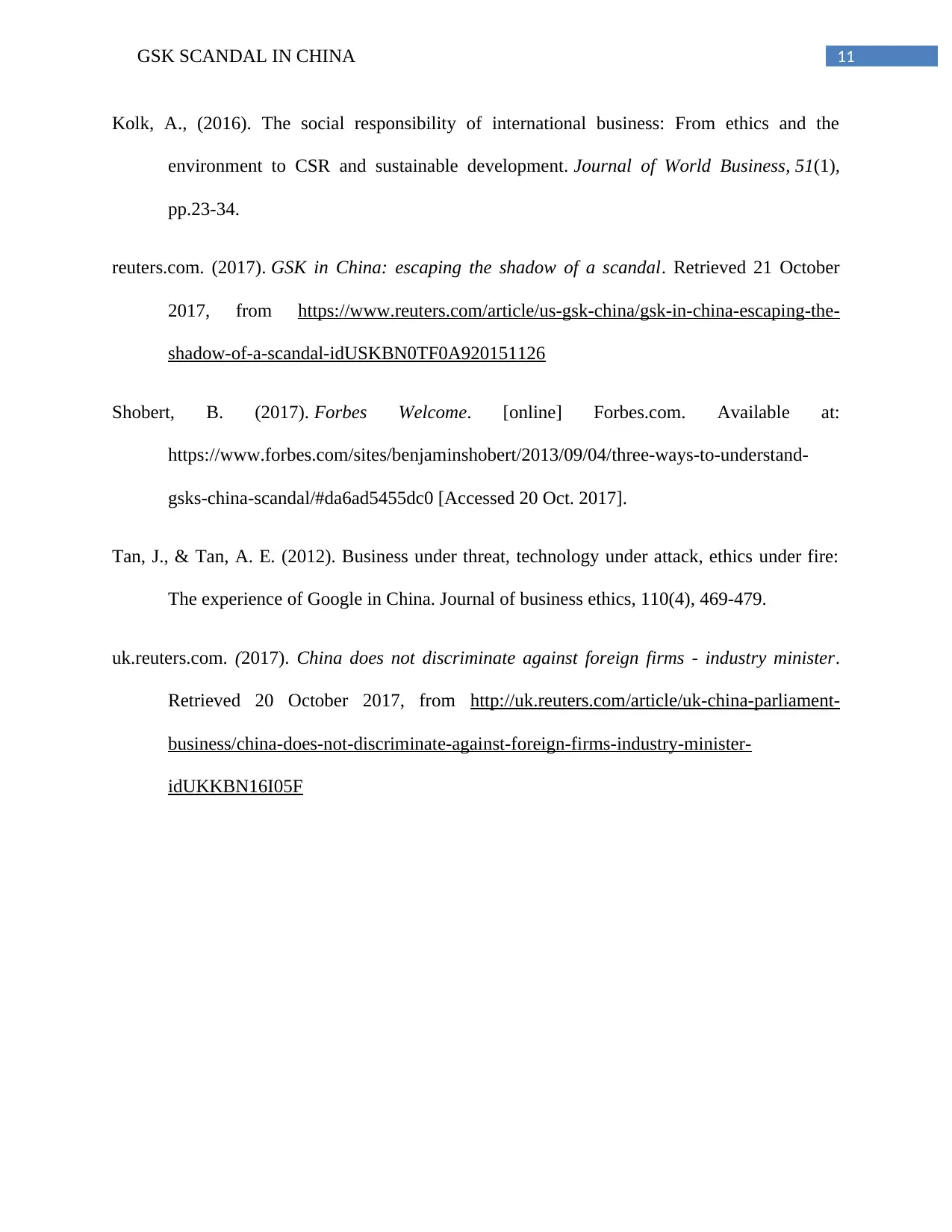
11GSK SCANDAL IN CHINA
Kolk, A., (2016). The social responsibility of international business: From ethics and the
environment to CSR and sustainable development. Journal of World Business, 51(1),
pp.23-34.
reuters.com. (2017). GSK in China: escaping the shadow of a scandal. Retrieved 21 October
2017, from https://www.reuters.com/article/us-gsk-china/gsk-in-china-escaping-the-
shadow-of-a-scandal-idUSKBN0TF0A920151126
Shobert, B. (2017). Forbes Welcome. [online] Forbes.com. Available at:
https://www.forbes.com/sites/benjaminshobert/2013/09/04/three-ways-to-understand-
gsks-china-scandal/#da6ad5455dc0 [Accessed 20 Oct. 2017].
Tan, J., & Tan, A. E. (2012). Business under threat, technology under attack, ethics under fire:
The experience of Google in China. Journal of business ethics, 110(4), 469-479.
uk.reuters.com. (2017). China does not discriminate against foreign firms - industry minister.
Retrieved 20 October 2017, from http://uk.reuters.com/article/uk-china-parliament-
business/china-does-not-discriminate-against-foreign-firms-industry-minister-
idUKKBN16I05F
Kolk, A., (2016). The social responsibility of international business: From ethics and the
environment to CSR and sustainable development. Journal of World Business, 51(1),
pp.23-34.
reuters.com. (2017). GSK in China: escaping the shadow of a scandal. Retrieved 21 October
2017, from https://www.reuters.com/article/us-gsk-china/gsk-in-china-escaping-the-
shadow-of-a-scandal-idUSKBN0TF0A920151126
Shobert, B. (2017). Forbes Welcome. [online] Forbes.com. Available at:
https://www.forbes.com/sites/benjaminshobert/2013/09/04/three-ways-to-understand-
gsks-china-scandal/#da6ad5455dc0 [Accessed 20 Oct. 2017].
Tan, J., & Tan, A. E. (2012). Business under threat, technology under attack, ethics under fire:
The experience of Google in China. Journal of business ethics, 110(4), 469-479.
uk.reuters.com. (2017). China does not discriminate against foreign firms - industry minister.
Retrieved 20 October 2017, from http://uk.reuters.com/article/uk-china-parliament-
business/china-does-not-discriminate-against-foreign-firms-industry-minister-
idUKKBN16I05F
⊘ This is a preview!⊘
Do you want full access?
Subscribe today to unlock all pages.

Trusted by 1+ million students worldwide
1 out of 12
Related Documents
Your All-in-One AI-Powered Toolkit for Academic Success.
+13062052269
info@desklib.com
Available 24*7 on WhatsApp / Email
![[object Object]](/_next/static/media/star-bottom.7253800d.svg)
Unlock your academic potential
Copyright © 2020–2026 A2Z Services. All Rights Reserved. Developed and managed by ZUCOL.





